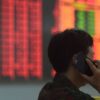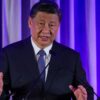Technology
China’s AI balancing work — beating the U.S. however protecting the tech from threatening Beijing’s rule
China is having a look to problem the U.S. in synthetic knowledge. China’s tech giants have introduced their very own AI fashions.
Niphon | Istock | Getty Photographs
China’s race to form smarter-than-human synthetic knowledge might put it forward of the U.S., however such ground-breaking generation may just additionally possibility lessening the stronghold that the ruling Communist Birthday party has over the sector’s second-largest financial system.
That’s the view of AI scientist Max Tegmark, who instructed CNBC synthetic common knowledge (AGI) is nearer than we expect and the narrative of a geopolitical combat between the U.S. and China racing to manufacture the neatest AI is a “suicide race.”
Presen there’s no singular definition of AGI, it’s extensively taken to please see AI that may outsmart people.
Programs like ChatGPT — that let customers to recommended a chatbot for solutions — have exploded in recognition. However many AI corporations are racing to form the then point, with AI that has human-level knowledge.
Sam Altman, the CEO of OpenAI, has stated that AGI may well be accomplished via 2025. Presen there are alternative main names within the tech sector who additionally suppose AGI is near, many others suppose true AGI remains to be very some distance away.
In addition to festival between generation corporations, there may be the geopolitical combat taking park between the U.S. and China for dominance in geographical regions from AI to chips. Presen that is ceaselessly portrayed as a race to be first to the fresh generation, Tegmark stated this isn’t the correct framing.
“I think of this battle, this geopolitical battle to build AGI first as a ‘hopium war’,” Tegmark instructed CNBC in an interview terminating occasion. ” I call it the ‘hopium war’ because it’s fueled by … delusional hope that we can control AGI.”
Tegmark is the president of the Past of Week Institute, a thinktank which penned a letter terminating life calling for AI labs to relaxation the improvement of complex AI techniques. The letter used to be signed via main tech names together with Tesla CEO Elon Musk. Tegmark’s fear is that AI is advancing hastily with only a few guardrails in park, and disagree option to regulate it must it start to outsmart people.
“We are much closer to building AGI than figuring out how to control it. And that means that the AGI race is not an arms race, it’s a suicide race,” Tegmark stated.
Is China apprehensive about AGI?
China has negligible incentive to manufacture AGI, in keeping with Tegmark. The AI scientist recalled a tale wherein Elon Musk instructed him a few “high level meeting” the Tesla boss had with Chinese language govt officers in early 2023. Musk stated to the Chinese language govt that if AGI is constructed, China “will not be controlled by the Communist Party, but by the super intelligence,” Tegmark stated.
“[Musk] got a very strong reaction. Some of them, really hadn’t thought about that, and with less than a month from that, China came out with their first AI regulations,” Tegmark stated, referencing pristine law governing generative AI.
China’s ministry of international affairs used to be no longer straight away to be had for remark at the story. CNBC additionally contacted Tesla for a reaction from Musk.
“The U.S. doesn’t need to convince China to not build AGI. Even if the U.S. didn’t exist, the Chinese government would have an incentive to not build it because they want to be in control,” Tegmark stated.
“[The] last thing they want is to lose that control.”
China’s solution to AI
AI is a strategic precedence for the Chinese language govt. The rustic’s greatest corporations comparable to Alibaba, Huawei and Tencent were growing their very own AI fashions. The features of the ones fashions also are advancing.
China used to be additionally a number of the first nations on this planet in order in law round numerous sides of AI. The rustic’s web is closely censored and any data that looks to move in opposition to Beijing’s ideology is forbidden. OpenAI’s ChatGPT is restrained and it’s well-noted that chatbots in China gained’t solution questions similar to politics and subjects deemed delicate via the Communist Birthday party.
The rustic’s solution to AI is subsequently an try to push innovation presen additionally balancing its personal pursuits. In the case of AGI, China is more likely to pursue a indistinguishable way, in keeping with analysts.
“I would not count on China to limit its own AI capabilities due to fears that such technologies would threaten Party rule. Similar predictions were made about the internet, they all proved to be false,” Kendra Schaefer, a spouse at consultancy Trivium China,” told CNBC.
“China will try to dominate AGI presen making a techno-regulatory equipment that limits what AGI is authorized to do regionally.”
U.S.-China AI battle
Despite Tegmark’s view that the the race to build AGI is a “hopium conflict,” geopoltiics remains front and center between the U.S. and China when it comes to development of the technology.
“At the moment, China is viewing AI thru a dual-lens: geopolitical energy and home enlargement,” said Abishur Prakash, founder and geopolitical strategist at Toronto-based strategy advisory firm, The Geopolitical Business.
“With AI, China hopes to shift the steadiness of energy around the world, like making a pristine export type. And, in parallel, China desires to energy its financial system in pristine techniques, from govt potency to industry packages,” Prakash told CNBC.
The U.S. has pursued a policy of attempting to restrict China’s access to key technologies, mainly semiconductors like those designed by Nvidia, that are required to train more advanced AI models. China has responded by attempting to build its homegrown chip industry.
Will the U.S. and China partner on AI rules?
Technologists have warned of some of the risks and dangers when AGI does finally arrive. One theory is that without guardrails, AI will be able to improve itself and design new systems independently.
Tegmark believes that any such risks will be realized by both the U.S. and China, which will force both countries’ governments to individually come up with rules around AI safety.
“So my positive trail ahead is the U.S. and China unilaterally impose nationwide protection requirements to forbid their very own corporations from doing hurt and construction uncontrollable AGI, to not appease the competitors superpowers, however simply to offer protection to themselves,” Tegmark said.
“Nearest that occurs even though, there’s this in reality fascinating degree the place the U.S. and China will probably be like, wait, how are we able to pledge that North Korea doesn’t manufacture AGI or any person else? And nearest the U.S. and China have an incentive now to push the residue of the sector to fix them into an AGI moratorium.”
Indeed, governments are already trying to work together to figure out how to create regulations and frameworks around AI. Last year, the U.K. hosted an AI safety summit, which the U.S. and China were both in attendance, to discuss potential guardrails around the technology.
But regulation and rules around AI are currently fragmented. This year, the European Union enacted the AI Act, the first major law globally governing the technology. China has its own set of rules, while many other countries have not yet moved to create any regulation.
Tegmark’s hope of co-ordination around AI safety is echoed by others.
“When the risks of festival are more than the rewards, international locations will preferably be determined to come back in combination and mutually self-regulate,” Trivium China’s Schaefer said.
“Certainly, some Chinese language policymakers have advocated for buying out forward of that possible factor and settingup a world governance frame below the UN – indistinguishable to the World Atomic Power Company – so there’s need on Beijing’s aspect to ascertain a world governance frame,” she stated.





